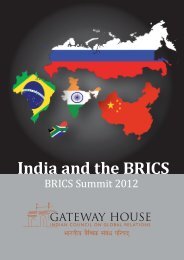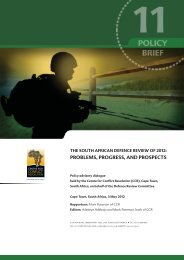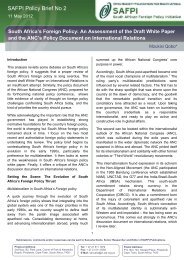Africa quarterly special on emerging powers.pdf - SAFPI
Africa quarterly special on emerging powers.pdf - SAFPI
Africa quarterly special on emerging powers.pdf - SAFPI
- No tags were found...
Create successful ePaper yourself
Turn your PDF publications into a flip-book with our unique Google optimized e-Paper software.
P A R A D I G M S H I F T17 percent. Since 2001, funding for IMET and FMF hasincreased approximately 35.6 percent and 27.8 percent,respectively [Williams, 2006].This marks a shift away from issues of humanitarian aid,peacekeeping and democracy to security and law and orderissues. Countries seen as central to the War <strong>on</strong> Terror —Ethiopia, Eritrea, Djibouti and Kenya — received the bulkof IMET assistance between 2001 and 2005. Angola, whichit needs to keep satisfied because of its oil resources, andRwanda, in which it is developing a strategic interest, havealso received such funding. The biggest loser in this periodwas South <str<strong>on</strong>g>Africa</str<strong>on</strong>g>, its strategic ally through the better part ofthe 20th century, where there was a 95 percent decline insuch funds.At the same time, the U.S. signed a memorandum ofunderstanding in April 2010 with South <str<strong>on</strong>g>Africa</str<strong>on</strong>g> to lay theframework for a ‘Strategic Dialogue’ focusing <strong>on</strong> issuesinvolving health, trade, energy and n<strong>on</strong>-proliferati<strong>on</strong>, am<strong>on</strong>gothers [U.S. Department of State, 2010]. While militaryprogrammes and aid have declined, South <str<strong>on</strong>g>Africa</str<strong>on</strong>g>’s stabilisingpotential and its latent importance as a partner is recognised,particularly under the Obama administrati<strong>on</strong>, which has beenfurthering an <strong>on</strong>going N<strong>on</strong>-proliferati<strong>on</strong> and DisarmamentDialogue, and has also signed an agreement <strong>on</strong> Cooperati<strong>on</strong><strong>on</strong> Nuclear Energy Research and Dialogue in April 2010[U.S. Department of State, 2010].In fact, apart from trade, particularly in hydrocarb<strong>on</strong>s,security issues appear to be uppermost in U.S. foreignpolicy c<strong>on</strong>siderati<strong>on</strong>s. Such security c<strong>on</strong>siderati<strong>on</strong>s may belinked to securing its oil interests particularly since it appearsto be keen <strong>on</strong> shifting out of its dependence <strong>on</strong> MiddleEastern oil after the Iraq War and the highly volatile natureof its current politics. Even President Obama, despite hisrhetoric of viewing <str<strong>on</strong>g>Africa</str<strong>on</strong>g> as a “partner” and being “ready toc<strong>on</strong>tribute to <str<strong>on</strong>g>Africa</str<strong>on</strong>g>’s growth and stabilisati<strong>on</strong>”, strengthening<str<strong>on</strong>g>Africa</str<strong>on</strong>g>n governments so that ultimately “<str<strong>on</strong>g>Africa</str<strong>on</strong>g>n leaderstake c<strong>on</strong>trol”, is, in essence, c<strong>on</strong>tinuing and expandingformer president George W. Bush’s unilateralist securitypolicy in the c<strong>on</strong>tinent.The Obama administrati<strong>on</strong> asked for $38 milli<strong>on</strong> for aforeign military financing programme to pay for U.S. arms salesto <str<strong>on</strong>g>Africa</str<strong>on</strong>g>, $21 milli<strong>on</strong> for IMET and $24.4 milli<strong>on</strong> forAnti-Terror Financing Programmes in 2010 [News & Trends:<str<strong>on</strong>g>Africa</str<strong>on</strong>g>, 2010]. Overarching all these is the new <str<strong>on</strong>g>Africa</str<strong>on</strong>g>nCommand or AFRICOM, which transited to an independentUnified Command Status in 2008 [Dickins<strong>on</strong>, 2009]. Therewas no separate defence Command for <str<strong>on</strong>g>Africa</str<strong>on</strong>g> prior to the settingup of AFRICOM, which is now resp<strong>on</strong>sible for U.S.military relati<strong>on</strong>s with all <str<strong>on</strong>g>Africa</str<strong>on</strong>g>n countries, given the fact,according to its website, that <str<strong>on</strong>g>Africa</str<strong>on</strong>g> is “growing in military andec<strong>on</strong>omic importance in global affairs” [U.S. AFRICOMPublic Affairs Office, 2010]. Obama also appointed a SpecialEnvoy to Sudan, Gen. Scott Grati<strong>on</strong>, as well as a Special Adviserfor the Great Lakes, former C<strong>on</strong>gressman Howard Wolpe.While the new U.S. relati<strong>on</strong>ship with <str<strong>on</strong>g>Africa</str<strong>on</strong>g>n statesreflects a kind of aggressive diplomacy that may not beovertly attractive to <str<strong>on</strong>g>Africa</str<strong>on</strong>g>n states, the fact remains that theU.S. is still the world’s sole superpower and has the world’slargest GDP. As such, it is attractive as a trading partner andit is in <str<strong>on</strong>g>Africa</str<strong>on</strong>g>n countries’ interest to trade with it if the termsare suitable.eU and africaThe EU, <strong>on</strong> the other hand, follows a different policy andits diplomacy is much more subtle but perhaps moreeffective. The EU appears to have taken less<strong>on</strong>s in diplomaticstrategy from the <strong>emerging</strong> <strong>powers</strong> and is pursuing itsagenda in <str<strong>on</strong>g>Africa</str<strong>on</strong>g> <strong>on</strong> similar lines. Although the Euroz<strong>on</strong>ecrisis has affected its investment and purchasing power andshifted priorities for the time being, the EU has a l<strong>on</strong>g-termagenda for <str<strong>on</strong>g>Africa</str<strong>on</strong>g>. Europe has had trade links with<str<strong>on</strong>g>Africa</str<strong>on</strong>g> going back a l<strong>on</strong>g time. These links were in morec<strong>on</strong>temporary times enhanced by privileged agreements likethe Yaoundé and Lome C<strong>on</strong>venti<strong>on</strong>s and the more recentCot<strong>on</strong>ou agreement (2001) [Douaud, Caprile, 2008].In view of the fact that the EU is the biggest market for<str<strong>on</strong>g>Africa</str<strong>on</strong>g>n products, taking in around 85 percent of its cott<strong>on</strong>,fruits and vegetables, it is no w<strong>on</strong>der that Europe hasenduring interests in <str<strong>on</strong>g>Africa</str<strong>on</strong>g>. Faced with the World TradeOrganisati<strong>on</strong>’s (WTO) regime instituti<strong>on</strong>alisati<strong>on</strong>, it has beenforced to move away from privileged bilateral to WTOcompatiblemultilateral trade deals. As such, the EU alsolaunched negotiati<strong>on</strong>s <strong>on</strong> Ec<strong>on</strong>omic Partnership Agreements(EPAs) with all <str<strong>on</strong>g>Africa</str<strong>on</strong>g>n, Caribbean and Pacific (ACP)countries in 2002 [Nolte, 2002].It is interesting that the EU now focuses <strong>on</strong> <str<strong>on</strong>g>Africa</str<strong>on</strong>g>’sdevelopment as part of its agenda in that c<strong>on</strong>tinent much asIndia and China speak of cooperati<strong>on</strong> for mutual benefitinvolving infrastructural and other kinds of development in<str<strong>on</strong>g>Africa</str<strong>on</strong>g>. The difference, however, is that the EU emphasisesgood governance and human rights al<strong>on</strong>g with ec<strong>on</strong>omicgrowth. The security-development nexus, changes withinboth the AU and the EU, new internati<strong>on</strong>al developmentcommitments under the Millennium Development Goals(MDGs), increasing competiti<strong>on</strong> with the <strong>emerging</strong> <strong>powers</strong>(Asia is now <str<strong>on</strong>g>Africa</str<strong>on</strong>g>’s third-largest trading partner after theU.S. and the EU) and depleting energy and natural resources,are all factors behind the EU’s increasing interest in <str<strong>on</strong>g>Africa</str<strong>on</strong>g>ndevelopment. One of the objectives of the EU Strategy for<str<strong>on</strong>g>Africa</str<strong>on</strong>g>’s Development of 2005 was to “give people in lessadvanced countries c<strong>on</strong>trol over their own development”,focusing <strong>on</strong> four main pillars: peace and security, humanrights and good governance, health and educati<strong>on</strong>, andec<strong>on</strong>omic growth [Europa, 2005].Accordingly, the <str<strong>on</strong>g>Africa</str<strong>on</strong>g>-EU summit of 2007 in Lisb<strong>on</strong>created a new <str<strong>on</strong>g>Africa</str<strong>on</strong>g>-EU Strategic Partnership providing anacti<strong>on</strong> plan for 2008-10 <strong>on</strong> eight points of cooperati<strong>on</strong> thatinclude peace and security, MDGs, trade, democraticgovernance, science and space, energy, and climate change[<str<strong>on</strong>g>Africa</str<strong>on</strong>g>-EU Ministerial Troika, First Acti<strong>on</strong> Plan, 2007].32August 2011-January 2012





